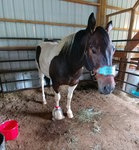

Cuss, a 7-year-old paint horse in Yacolt, has experienced a fair amount of physical discomfort in his life of barrel racing. The pain he felt at the end of last month may never be topped though.
Cuss belongs to Dianne Rinta, who on the day of the incident, June 22, said she discovered he was in pain while feeding and watering.
“I noticed he was limping around and aching,” Rinta said.
When she checked his body, Rinta saw the issue right away — Cuss had encountered a porcupine.
“There had to have been over 100 quills in his foot when we first saw it,” Rinta said.
Rinta thinks Cuss either accidently stepped over the porcupine, causing it to attack, or intentionally encountered the rodent and was pawing at it. Several years ago Cuss was found with three quills in his nose, so Rinta believes it was probably the latter.
“I’m sure he was just being curious,” Rinta said. “It ended much worse this time.”
Rinta’s husband Will went searching for the porcupine across their 10-acre property for about 45 minutes, but was unable to find it. That night, Dianne and Will began pulling out the quills and also called their son Travis, 27, for help. Together, the trio worked on Cuss’ foot for about three hours.
“He’s a white footed horse, so it was hard to find all the quills, especially the ones that broke off,” Dianne said.
The trio used hot water and sedatives to calm Cuss as they pulled out the quills. Dianne also called Dr. Brian Johnson of Equine Veterinary Service in Vancouver for advice.
“He was really hurting,” Dianne said. “He’s usually a nice horse, but he wasn’t real happy about any of it.”
Dianne said Cuss went to sleep that night with two small quills still in his foot because he was getting too defensive for them to finish.
“By that time he was done, it just wasn’t going to happen and someone was going to get hurt,” she said.
The next morning Cuss was still being edgy, but got tricked into letting Dianne remove the final quills.
“I was massaging his leg, then secretly pulled out the pliers and got them,” Dianne said.
Almost two weeks since the incident, Cuss is still recovering and limping around. Dianne said she’s had to cancel one barrel racing event with him, but thinks he will be able to run again soon.
Dianne has been around horses for 55 years and felt confident handling the quill extraction on her own, but said less experienced handlers should hire a veterinarian in that situation because it’s tedious.
Staff members at both Amazia Veterinary service in Brush Prairie and Countryside Veterinary Service in Ridgefield said they couldn’t recall the last time they received a case of removing quills.
“If it happens to your horse and you’re going to do it, you need patience. … Lots and lots of patience,” Dianne said. “It’s not easy and takes forever.”